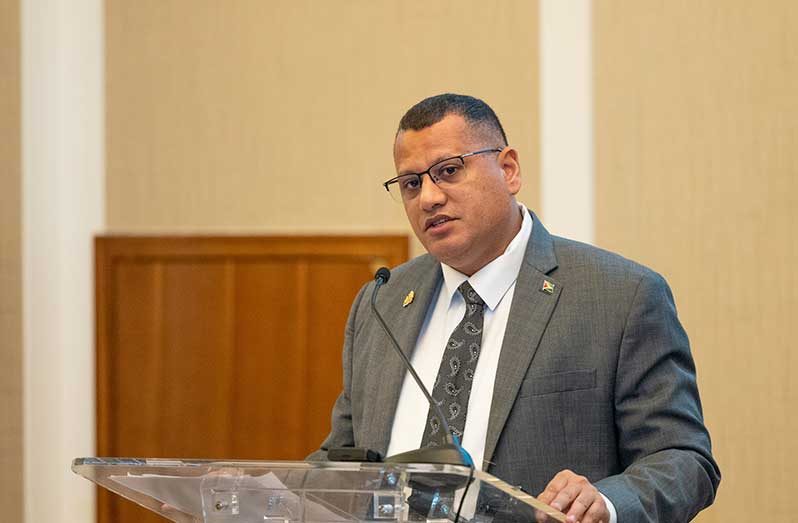In a significant celebration of international cooperation, Guyana’s Minister of Housing and Water, Collin Croal, highlighted the enduring partnership between Guyana and Japan, focusing on their collaborative efforts in the water sector.
Speaking on Monday at the Japan-CARICOM (Caribbean Community) Friendship Year 2024 Event at the Marriott Hotel, he underscored Japan’s contributions to CARICOM nations, emphasising the vital importance of sustainable water access in the face of escalating climate change challenges.
Minister Croal pointed out that water is the lifeblood of our planet and, of our own lives.
He, however, noted that for many nations, access to clean, reliable, and sustainable water sources remains a profound challenge. The minister said: “In the Caribbean, where communities depend on consistent water supplies for agriculture, public health, tourism, and overall economic development, the growing impacts of climate change—such as rising sea levels, intensified storms, and prolonged droughts—only amplify these challenges.”
Recognising this, he said CARICOM nations have long prioritised water resilience, but true progress is only possible with collaborative partnerships.
This situation, he emphasised, necessitates strong partnerships like that between Guyana and Japan, which has evolved over more than five decades.
“Today we are celebrating and strengthening a friendship and partnership that exemplify international cooperation, a commitment to sustainability and shared values – Japan’s collaboration with CARICOM, in the vital water sector,” Croal stated.
As an island nation, he said Japan understands the unique vulnerabilities and resilience required of countries encircled by water.
In recent years, he said Japan has offered technical assistance, capacity building, and innovative solutions to support CARICOM’s water management goals.
He added: “Through our partnership, Japan has brought not only technological expertise but a spirit of solidarity, grounded in mutual respect and shared interests. Our shared initiatives have emphasised the protection and sustainable use of water resources, climate resilience, and the efficient delivery of water services—objectives that are essential for both immediate needs and long-term development.”
The collaboration has produced tangible results in Guyana.
Minister Croal explained that since 1989 Japan has provided extensive grant aid and training programmes aimed at improving various sectors, including health, water, and energy.
Significant projects include the reconstruction of the New Amsterdam Hospital and the construction of the CARICOM Secretariat Headquarters in Georgetown, both of which have had lasting impacts on local infrastructure.
One of the standout projects cited by Minister Croal is the 2008 completion of the Japanese-funded water treatment plant in Queenstown, Corriverton, Berbice.
He pointed out that this has brought safe water access to over 15,000 residents.
He explained that the project involved rehabilitating existing wells, constructing new treatment facilities, and installing necessary infrastructure, demonstrating Japan’s commitment to addressing urgent water supply needs in the region.
He said this project followed the completion of the first phase, which involved the construction of a treatment plant at Number 56 Village in Corentyne. The Minister said that Japan has helped Guyana with the rehabilitation of the East Demerara Water Conservancy Project.
Additionally, he pointed out that the private sector benefited substantially from the procurement of goods and spares, which were critical to the revitalisation of its productive capacity.
While Guyana has never been a recipient of a Japanese Loan, in recent years having been categorised as an Upper Middle-Income Country, he disclosed that the country recently received a concessional loan aimed at refurbishing the Guyana Water Incorporated (GWI).
According to him, this new financial support comes at a crucial time as the government collaborates with the Inter-American Development Bank (IDB) and Japan on plans for a new water treatment plant at Diamond on the East Bank of Demerara (EBD).
“Once implemented, this project will reduce our dependence on some of our water sources while providing a more reliable supply of water to residents on the East Bank of Demerara.”
Minister Croal expressed gratitude for Japan’s unwavering support, highlighting its importance in helping Guyana meet its water-related targets. “Your support has helped us to meet water targets that we have set for our country through the years, and we are grateful,” he remarked, noting that such collaborations are vital as the Caribbean faces increasing climate risks.
Looking ahead, the minister called for continued collaboration.
“Climate forecasts indicate that the Caribbean will continue to face increasing risks, and water scarcity will become an even more pressing challenge. We hope that you will continue to share with us your advancements in water saving technologies, particularly in the areas of eco-friendly infrastructure and digital monitoring tools,” he said.
The partnership between Japan and CARICOM nations is not just about technology or infrastructure, according to Croal; it is about the lives impacted by access to clean and reliable water. “Access to clean, safe, and reliable water means greater opportunities, improved health, and resilience needed to thrive in an uncertain future,” he stated, urging all stakeholders to reaffirm their commitment to building a future where every community has access to essential water resources.
In addition to Minister Croal, the event featured CARICOM Secretary-General Dr. Carla Barnett, Country Representative of the IDB Office in Guyana Lorena Solórzano Salazar, Ambassador of Japan to Trinidad and Tobago Matsubara Yutaka, and JICA Senior Vice President Imoto Sachiko.
This year’s marks the 30th anniversary of the start of the Japan-CARICOM consultations.
Tuesday’s event convened CARICOM, the government of Guyana, GWI and the Government of Japan, hosted by the IDB in partnership with the Japan International Cooperation Agency (JICA).
The discussions overviewed the past cooperation and new opportunities of cooperation for the next 10 years. The JICA has been actively involved in various projects across the CARICOM.
Some keys areas of cooperation are: disaster risk reduction and climate change counter measures, health and sanitation improvement, waste management, education sector enhancement, agriculture and fisheries development and private sector development.
JICA is implementing 18 projects in the region in the form of Official Development Assistance (ODA) loans, grant aid and technical cooperation. Since 1999, JICA has been offering training courses in Japan to CARICOM countries, and approximately 1,300 officers have participated to date. JICA has 96 overseas offices around the world. Japan’s policy towards CARICOM, which was announced in July 2014, promises Japan’s proactive approach towards overcoming vulnerabilities particular to Caribbean states. This will be executed through the use of Japanese technologies and expertise. Guyana and Japan established diplomatic relations in 1967.





.jpg)








